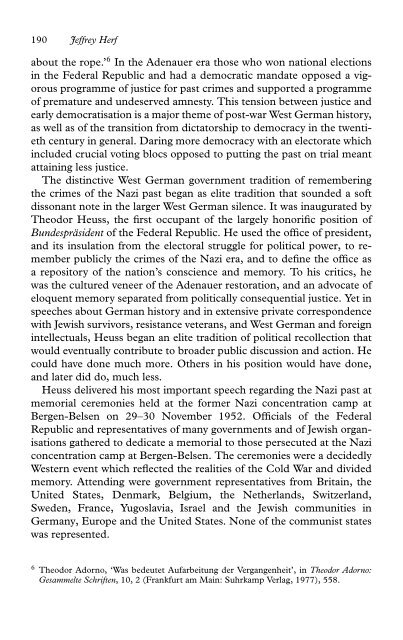Memory and Power in Post-War Europe: Studies in the Presence of ...
Memory and Power in Post-War Europe: Studies in the Presence of ...
Memory and Power in Post-War Europe: Studies in the Presence of ...
You also want an ePaper? Increase the reach of your titles
YUMPU automatically turns print PDFs into web optimized ePapers that Google loves.
190 Jeffrey Herf<br />
about <strong>the</strong> rope.’ 6 In <strong>the</strong> Adenauer era those who won national elections<br />
<strong>in</strong> <strong>the</strong> Federal Republic <strong>and</strong> had a democratic m<strong>and</strong>ate opposed a vigorous<br />
programme <strong>of</strong> justice for past crimes <strong>and</strong> supported a programme<br />
<strong>of</strong> premature <strong>and</strong> undeserved amnesty. This tension between justice <strong>and</strong><br />
early democratisation is a major <strong>the</strong>me <strong>of</strong> post-war West German history,<br />
as well as <strong>of</strong> <strong>the</strong> transition from dictatorship to democracy <strong>in</strong> <strong>the</strong> twentieth<br />
century <strong>in</strong> general. Dar<strong>in</strong>g more democracy with an electorate which<br />
<strong>in</strong>cluded crucial vot<strong>in</strong>g blocs opposed to putt<strong>in</strong>g <strong>the</strong> past on trial meant<br />
atta<strong>in</strong><strong>in</strong>g less justice.<br />
The dist<strong>in</strong>ctive West German government tradition <strong>of</strong> remember<strong>in</strong>g<br />
<strong>the</strong> crimes <strong>of</strong> <strong>the</strong> Nazi past began as elite tradition that sounded a s<strong>of</strong>t<br />
dissonant note <strong>in</strong> <strong>the</strong> larger West German silence. It was <strong>in</strong>augurated by<br />
Theodor Heuss, <strong>the</strong> first occupant <strong>of</strong> <strong>the</strong> largely honorific position <strong>of</strong><br />
Bundespräsident <strong>of</strong> <strong>the</strong> Federal Republic. He used <strong>the</strong> <strong>of</strong>fice <strong>of</strong> president,<br />
<strong>and</strong> its <strong>in</strong>sulation from <strong>the</strong> electoral struggle for political power, to remember<br />
publicly <strong>the</strong> crimes <strong>of</strong> <strong>the</strong> Nazi era, <strong>and</strong> to def<strong>in</strong>e <strong>the</strong> <strong>of</strong>fice as<br />
a repository <strong>of</strong> <strong>the</strong> nation’s conscience <strong>and</strong> memory. To his critics, he<br />
was <strong>the</strong> cultured veneer <strong>of</strong> <strong>the</strong> Adenauer restoration, <strong>and</strong> an advocate <strong>of</strong><br />
eloquent memory separated from politically consequential justice. Yet <strong>in</strong><br />
speeches about German history <strong>and</strong> <strong>in</strong> extensive private correspondence<br />
with Jewish survivors, resistance veterans, <strong>and</strong> West German <strong>and</strong> foreign<br />
<strong>in</strong>tellectuals, Heuss began an elite tradition <strong>of</strong> political recollection that<br />
would eventually contribute to broader public discussion <strong>and</strong> action. He<br />
could have done much more. O<strong>the</strong>rs <strong>in</strong> his position would have done,<br />
<strong>and</strong> later did do, much less.<br />
Heuss delivered his most important speech regard<strong>in</strong>g <strong>the</strong> Nazi past at<br />
memorial ceremonies held at <strong>the</strong> former Nazi concentration camp at<br />
Bergen-Belsen on 29–30 November 1952. Officials <strong>of</strong> <strong>the</strong> Federal<br />
Republic <strong>and</strong> representatives <strong>of</strong> many governments <strong>and</strong> <strong>of</strong> Jewish organisations<br />
ga<strong>the</strong>red to dedicate a memorial to those persecuted at <strong>the</strong> Nazi<br />
concentration camp at Bergen-Belsen. The ceremonies were a decidedly<br />
Western event which reflected <strong>the</strong> realities <strong>of</strong> <strong>the</strong> Cold <strong>War</strong> <strong>and</strong> divided<br />
memory. Attend<strong>in</strong>g were government representatives from Brita<strong>in</strong>, <strong>the</strong><br />
United States, Denmark, Belgium, <strong>the</strong> Ne<strong>the</strong>rl<strong>and</strong>s, Switzerl<strong>and</strong>,<br />
Sweden, France, Yugoslavia, Israel <strong>and</strong> <strong>the</strong> Jewish communities <strong>in</strong><br />
Germany, <strong>Europe</strong> <strong>and</strong> <strong>the</strong> United States. None <strong>of</strong> <strong>the</strong> communist states<br />
was represented.<br />
6 Theodor Adorno, ‘Was bedeutet Aufarbeitung der Vergangenheit’, <strong>in</strong> Theodor Adorno:<br />
Gesammelte Schriften, 10, 2 (Frankfurt am Ma<strong>in</strong>: Suhrkamp Verlag, 1977), 558.
















